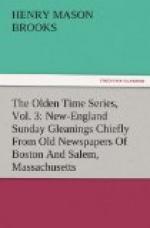One thing which prevents many people from attending public worship on Sunday is the increasing tendency towards ritualism,—or perhaps, we should say, making the services less instructive than formerly, and more devotional or emotional. This is seen not only in the Episcopal Church, but also among many other denominations. Even Congregational Orthodox—descendants of the Pilgrim Fathers—introduce prayer-books and responsive services, and make their church buildings more ecclesiastical in appearance, to look as much as possible like Episcopal churches. All these things to many minds are not edifying, to say the least, and consequently such persons absent themselves from service. Those too who are impressed by emotional religion join the Episcopalians, so that for the time there is an apparent increase in the attendance at the Episcopal churches, gained from churches of other denominations; and especially too as fashion decrees nowadays that “it is the proper thing to do” to go to the Episcopal Church, whether you believe in its doctrines or not. So that at length there are a great many people who think when church-going gets to be a matter of fashion, there is quite as much real religion to be found outside as inside the church; consequently they lose their interest. All these causes must be taken together; of course no one thing alone accounts for the change in regard to church attendance.
We quote the following remarks from a recent English paper ("The Unitarian Herald"); they have a direct bearing on our subject, and are worthy of consideration by those who neglect public worship or favor a more secular Sunday. Among other things, the speaker (the Rev. John Page Hopps) says:
“So far as we can see, the old orthodox believers were right when they called public worship ‘a means of grace;’ and if human experience is of any value, it is an undoubted fact that a great multitude which no man could number have felt the grace-giving influence of it. It is as true as ever that man cannot ’live by bread alone,’ but that he needs also the ’word that proceedeth from the mouth of God;’ and if it is true, as we believe, that the word of God does come home with special force and pathos when worship is joined in by kindred souls, the argument for public worship, from this point of view, seems complete. And yet, half in jest and half in earnest, and sometimes altogether in earnest, we hear it said that a man can worship God in the fields quite as well as in the church. ‘Perhaps he can,’ said a wise man once, ‘but does he?’ I wonder whether we shall go on in this direction until we hear it said that a man can worship God playing at lawn-tennis as in attending public worship? Thus there may actually come into existence a cant of the absentee which shall be as really cant as the cant of the devotee; for the use of the word ‘worship’ in such instances is a glaring case of exaggeration tinged with self-deception, which is the very essence




